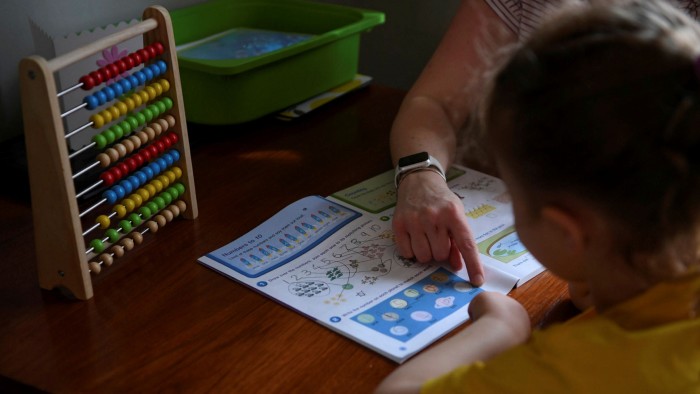Low adult numeracy is holding the UK back

Simply sign up to the UK employment myFT Digest -- delivered directly to your inbox.
The writer is chair of National Numeracy, a UK charity
Jim, a 48-year-old former distribution centre worker had a life-long fear of numbers. He used to dread going out for dinner with friends, because he was unable to work out how the bill should be split at the end of the meal. So he ordered the same meal year after year. A simple calculation error at work resulted in him moving from a semi-skilled job back to a manual role, with a reinforced belief that numbers were not for him.
Three years later, Jim (not his real name) now works with numbers on a daily basis at an estate agency. Targeted support and training have turned around not only his life, but also his ability to support his children with their homework, ending the intergenerational cycle of functional innumeracy in his own family.
Jim was one of the millions of UK citizens to whom the chancellor referred last week when announcing a new £560m adult numeracy skills programme. I heard his story while preparing for this week’s national Number Confidence Week — he is now one of National Numeracy’s “number heroes”, after struggling all his life with everyday maths.
The UK sits in the bottom half of the OECD numeracy skills rankings, alongside the US, France and Italy. About half of all adults have the numeracy level expected by the end of primary school. Only a fifth are functionally numerate — measured as the equivalent of a GCSE grade 4 (C) or above.
This most affects the least advantaged. Research from Pro Bono Economics shows the cost to the UK as a whole in terms of £25bn lost wages. But low numeracy also hits progression at work, increases debt and money problems, hampers supporting children at school, widens regional disparity, damages labour market productivity, and increases inequality and poor health outcomes.
FT Flic

Financial literacy education gives young people the foundations for future prosperity — and can help economically disadvantaged people out of deprivation. Join the FT Flic campaign to promote financial literacy in the UK and around the world
The OECD has also identified low numeracy to be correlated with lower levels of trust and less involvement in political processes in all participating countries. A causal relationship of low skills and trust is hard to prove, but as the OECD comments: “trust is the glue of modern societies and the foundation of economic behaviour”.
Our research demonstrates that building initial confidence is the effective way to get the most disadvantaged on to the first step of the skills ladder. Emphasising the real-world value of numeracy is key. Typical attitudes such as “I just can’t do maths” can be addressed by meeting people where they are comfortable, on their own terms, in their own time and with an approach that treats them as adults.
So Rishi Sunak’s Multiply programme, which aims to transform the lives of 500,000 adults held back in the jobs market by low numeracy, is extremely welcome, especially after a decade of cuts to the UK skills budget.
Previous funding has focused on qualifications and courses for more confident learners. This new investment is a decisive move to target those who struggle the most. It could boost number confidence and numeracy among low-skilled adults, through personal tutoring, digital training and tailored courses.
This will clearly benefit employers. But alongside government investment, businesses have a role to play in improving adult numeracy: via training for their own workers and by collaborating locally with government and charities.
Low number confidence among school leavers remains a significant priority for the UK. Alone in the developed world, England’s youngest jobseekers are less numerate and literate than their grandparents. John Lewis chair Dame Sharon White said recently that many of their 16-year-old hires have been “basically completely failed” by the education system.
But Jim’s story shows how targeted support can transform lives not only for adults with low skills but also for their children.
Comments